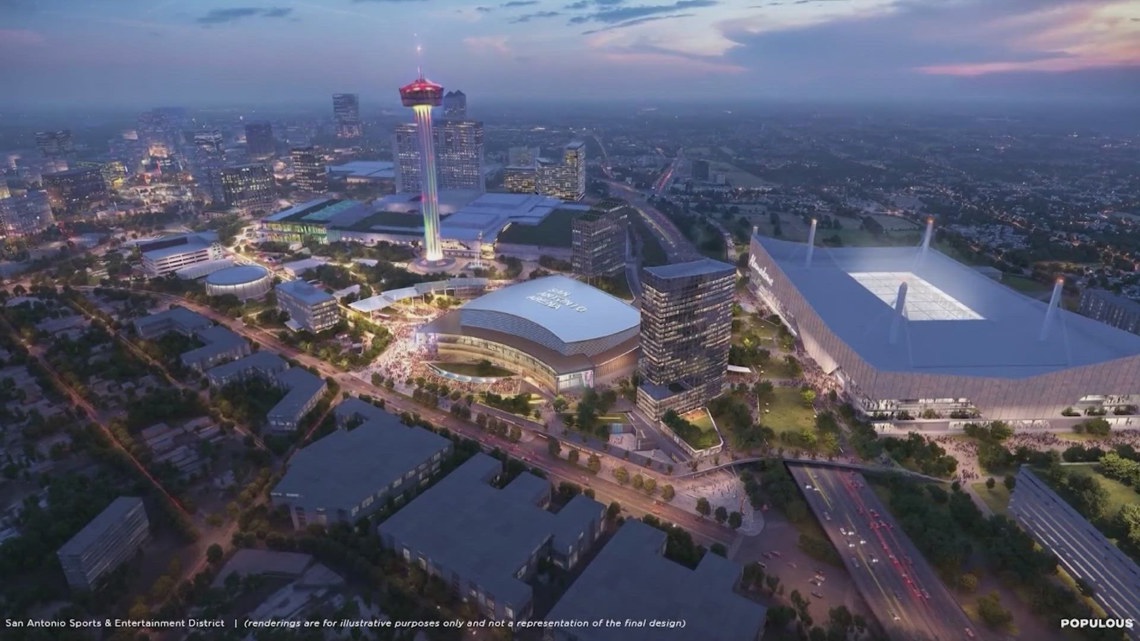An updated agreement approved by the Commissioners Court sets a deadline for stakeholders to share their funding plans in an open forum.
SAN ANTONIO — Though the San Antonio Spurs are months or even years away from breaking ground on a new arena in the heart of the city, time is ticking for local officials to take their shot if they want a potential key funding stream to go before voters in November.
Bexar County has said it has until August to call a venue tax election for this fall. That represents a potential key funding source and would put the option of using the existing tax to help fund a new arena – expected to cost anywhere from $1.2 billion to $1.5 billion – before voters.
In basketball terms: Local leaders are entering the fourth quarter of a tight game, something County Commissioner Grant Moody alluded to on Tuesday when the county approved an updated agreement with the Spurs and City of San Antonio.
“Time is running out here, in terms of the timeline that’s been laid out,” Moody said. “We have probably 90 days before we need to get a clear language to the state in order to put something on the ballot in November. We need to get cards on the table.”
Moody’s comments came moments before county commissioners unanimously approved an updated Memorandum of Understanding (MOU) with the city and Spurs anchored by three priorities:
- Determining the future of the Spurs’ current home at Frost Bank Center, including potential redevelopment of the grounds to continue attracting major events
- San Antonio’s dreams of a downtown sports and entertainment district, complete with an expanded convention center, land bridge over Interstate 37, and introduction of new retail and mixed-use development
- The next home of the Spurs, expected to be built where the now-defunct Institute of Texan Cultures currently sits
The updated MOU adds stipulations regarding community engagement and due diligence to abide by current ordinances.
More crucially, however, it kicks discussions between the three parties into another gear and sets a deadline for when funding commitments for the projects must be shared.
“The city, county and Spurs will work to publicly lay out their respective contributions for a funding framework no later than the beginning of July 2025, to the extent feasible,” the MOU stipulates.
Bexar County’s existing venue tax consists of a 1.75% hotel/motel occupancy tax and a 5% short-term rental tax. If the county were to maximize contributions from the venue tax for the next few years, they could contribute up to nearly $400 million. If the hotel/motel occupancy tax were raised to 2%, they could contribute nearly $450 million.
The deadline outline in the new MOU with the county’s deadline to call a venue tax ballot item for November and reflects Moody’s desire for discussions to be brought into the open.
“I think the county has been pretty forthcoming in laying out what the potential revenue would be from the venue tax,” Moody said. “If we put in 200 (million), 300 (million), whatever that number is, we have a pretty tight range of whatever’s possible with Bexar County. If the $1.5 billion price tag, as we’ve seen reported, is accurate, then we need to figure out where the other $1.3 (billion) is coming from.”


The City of San Antonio’s public discussions regarding funding commitments have largely been speculative up to this point, with City Council members mostly in agreement that they don’t want taxpayers footing the bill. City officials have floated a number of potential funding options for Project Marvel’s various components, including utilization of hotel taxes; a Tax Increment Reinvestment Zone, or TIRZ, to make use of incremental increases in property taxes; and private funding.
The Spurs have not publicly shared to what extent they’re willing or planning to fund their next home downtown.
Also at issue, however, is ensuring that the Frost Bank Center and Freeman Coliseum properties are set up for success going into the future. Last month, Bexar County Judge Peter Sakai said he wanted to ensure the current basketball arena “does not turn into the next Astrodome,” referring to the Houston stadium which has been vacant for years.
Renovations and upgrades to both the Freeman Coliseum and Frost Bank Center could cost an estimated $85 million.
Last month, City Council approved its own MOU along with an addition paving the way for council members Sukh Kaur and Jalen McKee-Rodriguez – who represent downtown and the east side areas, respectively – to accompany City Manager Erik Walsh to “substantive discussions” about the arena. The tweak was sparked by concerns that there hasn’t been adequate transparency in the negotiating process up to this point, and McKee-Rodriguez’s reservations about potentially transferring ownership of the Willow Springs Golf Course, which sits adjacent to the Frost Bank Center grounds, to the county.
That addition to include Kaur and McKee-Rodriguez wasn’t clearly stipulated in the new MOU approved by Bexar County. But in a statement to KENS 5, Walsh indicated that county officials would welcome the pair to the table.
“The city wants to make sure the county includes the District 2 council member in any community engagement efforts involving the city’s Willow Springs Golf Course,” Walsh said. “These changes were important to the city as we work together to plan these projects, and I appreciate the county’s willingness to accept them. The city is now ready to execute the agreement.”
